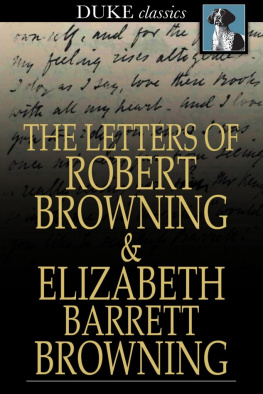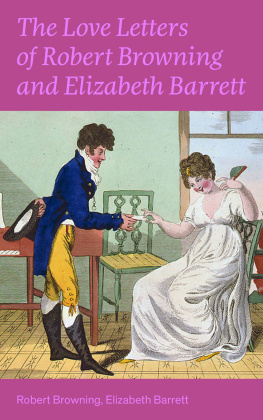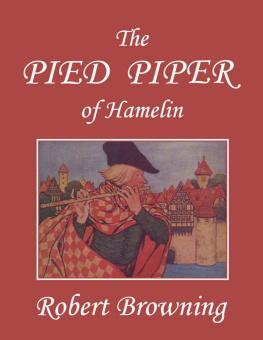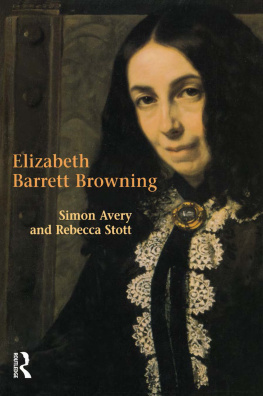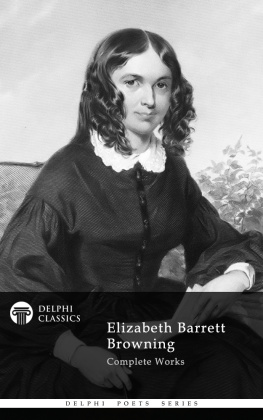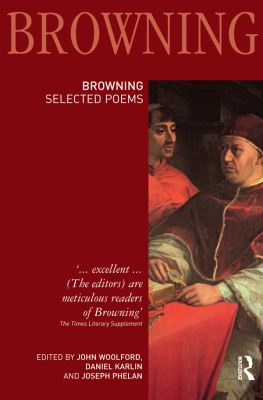THE LETTERS OF ROBERT BROWNING AND ELIZABETH BARRETT BROWNING
1845-1846
* * *
ROBERT BROWNING
ELIZABETH BARRETT BROWNING
*
The Letters of Robert Browning and Elizabeth Barrett Browning
1845-1846
From a 1900 edition
ISBN 978-1-62011-482-7
Duke Classics
2012 Duke Classics and its licensors. All rights reserved.
While every effort has been used to ensure the accuracy and reliability of the information contained in this edition, Duke Classics does not assume liability or responsibility for any errors or omissions in this book. Duke Classics does not accept responsibility for loss suffered as a result of reliance upon the accuracy or currency of information contained in this book.
Contents
*
Note
*
In considering the question of publishing these letters, which are allthat ever passed between my father and mother, for after theirmarriage they were never separated, it seemed to me that my onlyalternatives were to allow them to be published or to destroy them. Imight, indeed, have left the matter to the decision of others after mydeath, but that would be evading a responsibility which I feel that Iought to accept.
Ever since my mother's death these letters were kept by my father in acertain inlaid box, into which they exactly fitted, and where theyhave always rested, letter beside letter, each in its consecutiveorder and numbered on the envelope by his own hand.
My father destroyed all the rest of his correspondence, and not longbefore his death he said, referring to these letters: 'There they are,do with them as you please when I am dead and gone!'
A few of the letters are of little or no interest, but their omissionwould have saved only a few pages, and I think it well that thecorrespondence should be given in its entirety.
I wish to express my gratitude to my father's friend and mine, Mrs.Miller Morison, for her unfailing sympathy and assistance indeciphering some words which had become scarcely legible owing tofaded ink.
R.B.B.
1898.
The Letters
*
R.B. to E.B.B.
New Cross, Hatcham, Surrey.
[Post-mark, January 10, 1845.]
I love your verses with all my heart, dear Miss Barrett,and this isno off-hand complimentary letter that I shall write,whatever else,no prompt matter-of-course recognition of your genius, and there agraceful and natural end of the thing. Since the day last week when Ifirst read your poems, I quite laugh to remember how I have beenturning and turning again in my mind what I should be able to tell youof their effect upon me, for in the first flush of delight I thought Iwould this once get out of my habit of purely passive enjoyment, whenI do really enjoy, and thoroughly justify my admirationperhaps even,as a loyal fellow-craftsman should, try and find fault and do you somelittle good to be proud of hereafter!but nothing comes of it allsointo me has it gone, and part of me has it become, this great livingpoetry of yours, not a flower of which but took root and grewOh, howdifferent that is from lying to be dried and pressed flat, and prizedhighly, and put in a book with a proper account at top and bottom,and shut up and put away ... and the book called a 'Flora,' besides!After all, I need not give up the thought of doing that, too, in time;because even now, talking with whoever is worthy, I can give a reasonfor my faith in one and another excellence, the fresh strange music,the affluent language, the exquisite pathos and true new bravethought; but in this addressing myself to youyour own self, and forthe first time, my feeling rises altogether. I do, as I say, lovethese books with all my heartand I love you too. Do you know I wasonce not very far from seeingreally seeing you? Mr. Kenyon said tome one morning 'Would you like to see Miss Barrett?' then he went toannounce me,then he returned ... you were too unwell, and now it isyears ago, and I feel as at some untoward passage in my travels, as ifI had been close, so close, to some world's-wonder in chapel or crypt,only a screen to push and I might have entered, but there was someslight, so it now seems, slight and just sufficient bar to admission,and the half-opened door shut, and I went home my thousands of miles,and the sight was never to be?
Well, these Poems were to be, and this true thankful joy and pridewith which I feel myself,
Yours ever faithfully,
ROBERT BROWNING.
Miss Barrett, 50 Wimpole St.R. Browning.
E.B.B. to R.B.
50 Wimpole Street: Jan. 11, 1845.
I thank you, dear Mr. Browning, from the bottom of my heart. You meantto give me pleasure by your letterand even if the object had notbeen answered, I ought still to thank you. But it is thoroughlyanswered. Such a letter from such a hand! Sympathy is dearvery dearto me: but the sympathy of a poet, and of such a poet, is thequintessence of sympathy to me! Will you take back my gratitude forit?agreeing, too, that of all the commerce done in the world, fromTyre to Carthage, the exchange of sympathy for gratitude is the mostprincely thing!
For the rest you draw me on with your kindness. It is difficult to getrid of people when you once have given them too much pleasurethatis a fact, and we will not stop for the moral of it. What I was goingto sayafter a little natural hesitationis, that if ever you emergewithout inconvenient effort from your 'passive state,' and will tellme of such faults as rise to the surface and strike you as importantin my poems, (for of course, I do not think of troubling you withcriticism in detail) you will confer a lasting obligation on me, andone which I shall value so much, that I covet it at a distance. I donot pretend to any extraordinary meekness under criticism and it ispossible enough that I might not be altogether obedient to yours. Butwith my high respect for your power in your Art and for yourexperience as an artist, it would be quite impossible for me to hear ageneral observation of yours on what appear to you my master-faults,without being the better for it hereafter in some way. I ask for onlya sentence or two of general observationand I do not ask even forthat, so as to tease youbut in the humble, low voice, which is soexcellent a thing in womenparticularly when they go a-begging! Themost frequent general criticism I receive, is, I think, upon thestyle,'if I would but change my style'! But that is an objection(isn't it?) to the writer bodily? Buffon says, and every sincerewriter must feel, that 'Le style c'est l'homme'; a fact, however,scarcely calculated to lessen the objection with certain critics.
Is it indeed true that I was so near to the pleasure and honour ofmaking your acquaintance? and can it be true that you look back uponthe lost opportunity with any regret? Butyou knowif you hadentered the 'crypt,' you might have caught cold, or been tired todeath, and wished yourself 'a thousand miles off;' which would havebeen worse than travelling them. It is not my interest, however, toput such thoughts in your head about its being 'all for the best'; andI would rather hope (as I do) that what I lost by one chance I mayrecover by some future one. Winters shut me up as they do dormouse'seyes; in the spring, we shall see: and I am so much better that Iseem turning round to the outward world again. And in the meantime Ihave learnt to know your voice, not merely from the poetry but fromthe kindness in it. Mr. Kenyon often speaks of youdear Mr.Kenyon!who most unspeakably, or only speakably with tears in myeyes,has been my friend and helper, and my book's friend and helper!critic and sympathiser, true friend of all hours! You know him wellenough, I think, to understand that I must be grateful to him.

